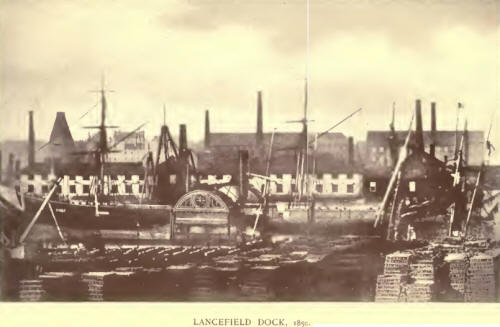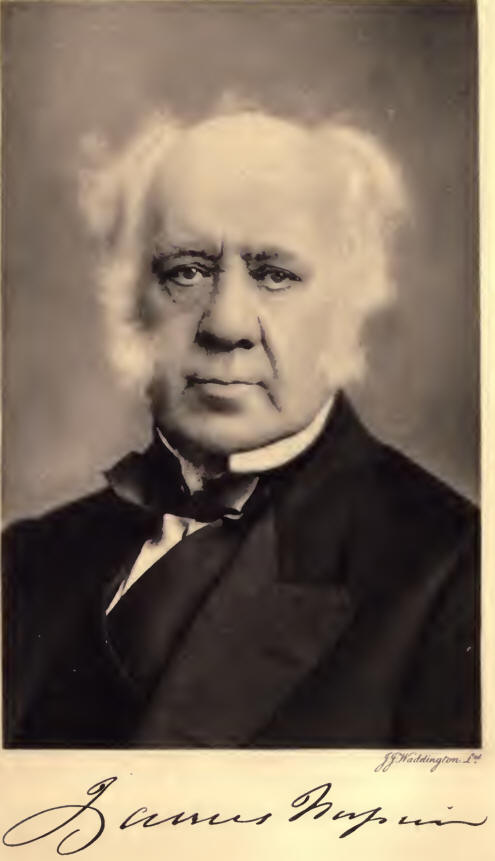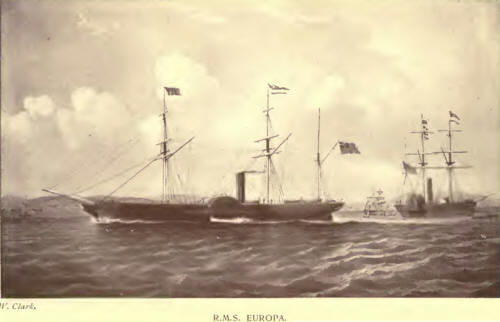|
It has been previously mentioned that there existed
an intimate connection between Robert and his cousin, David Napier,
from whom he had acquired the Camlachie Foundry. Robert was now
carrying on an extensive business in the Vulcan Works, but finding
them too small to overtake the contracts offered him, he again
approached his cousin in a characteristic letter.
“Whitevale, 7th Nov. 1835, 8 p.m.
“Dear Cousin,—I once heard you say that you would
either let or sell your premises at Lancefield. Are you so disposed
still ? If so, the rent for the whole, or the lowest price for the
whole, and the terms of payment ? At present I could not venture to
withdraw cash from my business to pay you cash, but I would pay
part.—I am, yours sincerely,
“R. Napier.”
David seemed desirous of leaving Glasgow, and the
negotiations thus abruptly entered on were concluded at once, as the
following letter shows :—
Lancefield, 7th Nov. 1835.
Dear Cousin, — I hereby become bound to let to you
for twelve years from Whitsunday next, the whole heritable property
belonging to me at Lancefield for £500 a-year, payable in equal
instalments at Martinmas and Whitsunday, you having a right to
purchase it within the first seven years of the lease on paying
£20,000. If a sale takes place, £5000 to be paid down in cash, and
the remainder in equal instalments, including interest; and during
the other five years of the lease I shall not be at liberty to sell
it without first offering it to you. During the course of the lease
you pay all public burdens.—I am, dear Cousin,
David Napier.
On completion of the agreement, Robert at once
removed his residence from White-vale to Lancefield House, and it
may be noted in passing that he exercised his right of purchase
within the stipulated time, and became proprietor in 1841. The
Lancefield property included a tidal basin; and in after years the
Clyde Trustees, in a very hectoring and bullying manner, endeavoured
to take this away, even threatening force, to which threat Napier
rejoined that he would repel force by force. They then engaged in
litigation, and the upshot of the matter was that Napier succeeded
in thoroughly defeating them, getting a special Act of Parliament,
by. which he remained undisputed master of his dock.

In the closing years of his life it was purchased by
the Trustees at a very large price. In fact, he got twice as much
for the dock as he paid for the whole Lance-field property.
About this time he entered into a new agreement with
his manager, Mr Elder, for a period of seven years. His salary was
to be £250 per annum, and 7s. 6d. for each Nominal Horse-Power his
employer contracted for, which bonus came to a large sum. There was
an unusual clause introduced into the contract—viz., that Elder was
to have the right of making plans for his own private use. When this
engagement expired it was renewed for other five years, and Napier,
in an interesting postscript to a letter written in November 184:2
to his friend Mr Moncrieff, says: “You will perceive Mr Elder and I
have arranged, in the spirit of true friendship, for another lease
of each other’s services for five years, if we are spared together
so long. If all is right with both of us, it should nearly, I think,
terminate the laborious and active part of our lives.” His
prognostications, however, were so far from being fulfilled that he
continued actively engaged in business for nearly thirty-five years
after this date.
In those days it was customary to have engagements
extending over a period of years with leading hands and foremen.
Thus in 1828 Mr Napier had brought James Thomson from Manchester to
act as leading smith, finisher, and turner for a period of years. He
was to receive the sum of £10 to defray the expense of conveying his
family from Manchester to Glasgow, and a wage of 36s. per week, to
be paid fortnightly; and a formal stamped document was drawn out
embodying this agreement. A new engagement was entered into on 8th
June 1838, reading thus :—
It is hereby agreed between James Thomson and Robert
Napier that the said James Thomson shall give the whole of his
personal services for the term of five years from and after this
date. On the other hand, Robert Napier to pay the said James Thomson
a yearly salary of £120 sterling, with a bonus of £5 for every pair
of engines that are finished and set agoing from the Works of Vulcan
and Lancefield Foundries, commencing with the following engines:
The Victorias, Fire King's, Glow-worm’s, Aberdeen and Arran
Company’s engines; these bonuses to be paid at the end of each year
for all engines set agoing and finished during the preceding year;
and we agree to put this on stamp paper.
Witness R. Napier.
H James Thomson.
About the same time he engaged George, brother of
James Thomson, as foreman of Lancefield Works on somewhat similar
terms. James Thomson by-and-by acquired some capital, and in 1847 he
left Mr Napier’s employment, and, along with his brother, founded
the firm of Messrs James & George Thomson, known afterwards as the
Clydebank Shipbuilding Company. Messrs Thomson removed their works
from Glasgow to Clydebank about 1870, and the firm has now become
incorporated with the Coal, Steel, and Armour-plate Company of John
Brown & Co., Sheffield and Clydebank.
Although helped by able foremen, many of whom
afterwards struck out for themselves, the business depended largely
on Napier’s own personal exertions; and as he was often called away,
his affairs were very apt to get into confusion. His wife’s cousin,
Mr John M‘Intyre (whose son, Mr James M‘Intyre, one of the founders
of the firm of Napier & M‘Intyre, was also at Vulcan Foundry), had
acted as his factotum for many years. His death, which took place in
1840, left his employer in a dilemma, as he had no person in his
establishment whom in his absence he could absolutely trust with the
management of affairs.
In this extremity he turned to his brother James, who
was then in partnership with his cousin William, under the style
of “ James & William Napier.” This firm owned the Swallow Foundry in
Washington Street, and had a good reputation as engineers and boiler
makers. James Napier was the inventor of the tubular boiler, for
which he took out a patent in 1830, and in the same year introduced
it successfully into steam vessels. At first the introduction was
attended with no small difficulty, and, to use the inventor’s own
words, “his firm had to contend with ignorant and interested
prejudices, and to give guarantees of security, and submit to
penalties and responsibilities in their contracts for these boilers
which no other engineer in the regular course of his business would
ever submit to.” He was a great authority on boilers, and his report
submitted to the Admiralty has already been referred to.
A patent for a steam-carriage was taken out by him in
conjunction with his Inveraray cousin, Mr David Napier of London,
grandfather of the present well known maker of motor-cars. At that
time, however, the difficulty of constructing a light and
satisfactory boiler was insurmountable, and the carriage was not a
success.
It may also be mentioned that James and William
Napier were among the first to build steamers of iron, a material
then only beginning to be used for shipbuilding.
No great inducement was offered to James to give up
his own business, where he had overcome the initial difficulties,
and in which he had good prospect of success; but being very loyal
to his eldest brother, who had a personal ascendancy over all the
members of his family, he was persuaded to dissolve partnership with
his cousin and come to Vulcan Foundry to take charge of Robert's
commercial affairs. The oversight of financial concerns was hardly
his role, as his bent was mechanical; and though overshadowed by his
brother, he was perhaps the more able engineer of the two.

While he endeavoured to confine himself to general
business, his engineering instincts occasionally asserted
themselves. Thus at the time when the side-levers in some of the
Cunard vessels cracked, and Elder, the manager, attributed the cause
to defective iron, suggesting as the only remedy that these
ponderous pieces should be made entirely of brass, thereby making
the cost of this type of engine prohibitive, James Kapier pointed
out that the fault lay in bad design, due allowance not having been
made for expansion. He predicted further failures, which actually
took place, and in the end his suggestions for remedying the defects
were adopted.
At a later date, when in London, viewing the Great
Eastern while she was on the stocks, he gave an opinion that the
launch would not be successful, as he personally had experienced
trouble with launching vessels broadside. The secretary of the
company, who did not happen to know him, derided his remarks as the
views of an ignorant man, and he was somewhat surprised at Mr
Napier’s acquaintance with Mr Scott Russell when the latter
cordially welcomed him. As is well known the launch was
unsuccessful, trouble arising exactly in the way Napier had
anticipated. While regretting the accident, he could not forget the
secretary’s incivility, and the paragraph announcing it was promptly
cut out of the newspaper and sent him, with the grim remark, “From
Mr James Napier, the result of his experience.”
James Napier's connection with his brother's business
lasted from 1841 till a short time before his death, which took
place in 1873. During this period he kept a sharp control over the
financial arrangements, and there is no doubt that his brother was
much indebted to him for the supervision of his commercial affairs,
which were left entirely in his hands. He was a fearless man, of
sterling upright character, a great favourite with all, and
familiarly known by the workmen and others as “Uncle James."
Outside of his immediate establishment the person
with whom Mr Napier came into closest business connection was his
much esteemed friend Mr Wood, who built the hulls of most of the
wooden steamers which he engined. John Wood was born in 1788, and
learnt the elements of his profession from his father, who was a
shipbuilder in Port-Glasgow. With a view to acquiring the best
knowledge of his trade he went to Lancaster, then a shipbuilding
centre, and served under a Mr Brocklebank for two years. There was
an interesting parallel between his early days and those of David
Napier, as, owing to his father’s death in 1811, he had to undertake
the task of constructing the Comet, which his father had contracted
to build. He subsequently built a great number of river-steamers
engined by David Napier, and afterwards steamers for deep-sea
navigation engined by Robert Napier, the largest of these being the
Cunard steamer Europa.
Mr Wood, while possessing the most eminent
attainments, was of a very modest and retiring disposition. He was
the most celebrated builder of wooden ships of his time, his vessels
being specially strong,and having a reputation for beauty and
symmetry of form. Mr Napier was so satisfied with his work that he
wished him to construct all the first steamers Mr Cunard ordered ;
but he would only undertake one, the Acadia. Writing to Mr Wood in
1841, he says : “I have uniformly in England and Scotland held you
and your work up as a pattern of all that was excellent, and I have
never yet had it proved to me that I was mistaken."

Mr Napier’s only sister was married to Mr Archibald
Reid, and on his death in 1837 his business was taken up by Mr Wood,
Mr Napier, Mr M'Intyre, and Mr John Reid, who carried it on under
the style of Messrs John Reid & Co.
With the advent of iron shipbuilding Mr Wood’s trade
was gone, and he practically retired, his business being merged in
Messrs Reid’s firm. In his latter years he resided at Port -
Glasgow, where he died in 1860 in the seventy-third year of his age.
One of the few enterprises outside his own business
with which Eobert Napier was connected was the Muirkirk Iron
Company, which he joined in 1834, Mr Ewing of Strathleven being then
the chief proprietor of the works.
Lord George Bentinck was manorial lord of the
Muirkirk estate, and being on intimate terms with Mr Assheton Smith,
he took a special interest in his friend’s acquisition of shares in
the Company, and wrote him several letters on the subject. His views
on the purchase were expressed in the following letter :—
Harcourt House, March 5, 1834.
Sir,—I have to apologise to you for not having sooner
acknowledged the honour of your last letter. The fact is I have been
so much engaged with the business of Parliament and of my
constituents that I really have had no time to attend to my own.
Since I received your letter I have spoken with Mr
Ewing, who agrees to postpone all further discussion of the subject
till we can all meet in town at the end of April or beginning of
May.
I hear from Kilmarnock that you and Mr Hamilton have
met, and that you have absolutely purchased Mr Yuill’s share for a
price equivalent to £11,500 for the whole. I sincerely trust you may
not find that you have paid too dearly. My valuer estimated the
materials of the work at £6812, 18s. 2d., and the Company’s estimate
did not exceed £7089, 16s. 2d. The stone, mortar, brick, and
wood-work of course are worth nothing to sell, whatever they may
have cost in the original erection. Of course, therefore, had the
works been abandoned, £7089, 16s. 2d. would have been the outside
price that the Company could have obtained for the works; and it is
therefore all that you should have paid for them. It is true that
when I stated this to Mr Ewing that gentleman threw out a hint that
he would batter down the walls with a park of artillery rather than
sell them standing for the breaking-up price ; but I need not say
that he must have been in joke and could not have been in earnest,
for considering the fatal effects of such a course of conduct upon
the existence of his old servants the Company’s workmen, he must
have been worse than an African savage or a Muscovite barbarian, —in
fact, he must have been a devil incarnate to have entertained
seriously for one moment so monstrous a thought. But Mr Ewing is
proverbially a warm-hearted man, with a polished mind, and of
course, therefore, as I said before, he was merely in joke.
Now in reference to my mention to you in a former
letter that Mr Ewing had represented the profits of the Muirkirk
Iron Works to have been in two separate years once £17,000 and the
other time £30,000, you will recollect that I did not guarantee the
fact, I only guaranteed the statement by Mr Ewing of such being the
fact. With respect to the fact itself, of course, as I was not at
that time manorial lord of those works, I could of my own knowledge
know nothing. And it is fair to say that I am inclined to be of
opinion that Mr Ewing is apt to think his geese swans, and
especially on that particular occasion when, in trying to persuade
me to give £20,000 for the works to the real intrinsic and bona
fide value of which I have above referred, I really do believe he
talked and wrote not me but himself into believing that the whole
concern had been much more profitable, and was altogether a much
finer thing than the reality could warrant.
I have troubled you at too great length, and in
having done so I beg to apologise, whilst I have the honour to
remain, Sir, your obedt. humble servant, Gr Bentinck.
To R Napier, Esq.
Napier’s connection with Muirkirk extended over a
period of ten years, during which time he acted as the Company’s
engineer. He gave great attention to the business, and made frequent
journeys to the works, which were managed by his friend Mr Carswell,
through whom he had been induced to join the enterprise.
Lord George Bentinck was a shrewd man, and his views
regarding Muirkirk were in the main correct. The business was far
from lucrative, and on the expiry of the contract of copartnery
Napier was glad to terminate his connection with it. |

